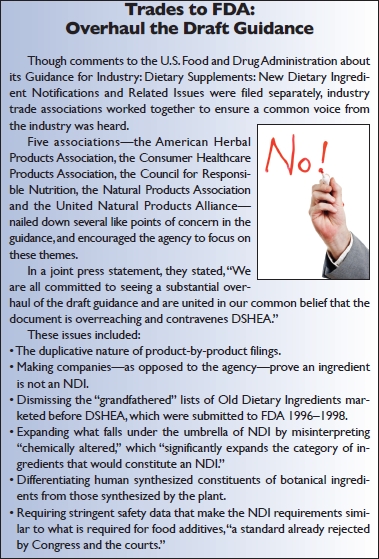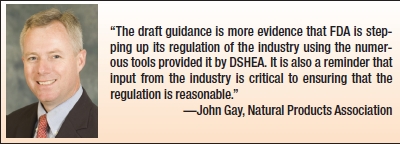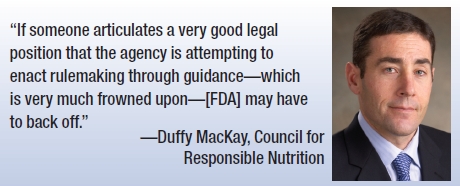December 2, 2011 has come and gone. Now, the natural products industry holds its collective breath to see how the U.S. Food and Drug Administration (FDA) will respond to the comments filed in reaction to its proposed guidance for industry on new dietary ingredients (NDIs). This document has the potential to affect nearly everyone with a stake in the dietary supplements industry.
For additional background, check out “NDIs Through the Eyes of Suppliers”here.
Integral to getting the industry’s collective voice heard about the guidance are our trade associations, which logged many hours preparing comments for FDA. In this round table, we hear from four industry trade associations and one advocacy group about their role in this process. We also highlight their takes on what we can learn about FDA, given how it handled this draft guidance.
Interviewed for this roundtable are:
 |
John Gay, executive director and CEO of the Natural Products Association (NPA). NPA is the largest and oldest natural products industry non-profit in the United States. Its 1,900 members represent more than 10,000 retail, manufacturing, wholesale and distribution natural products businesses. |  |
Gretchen DuBeau, executive and legal director for the Alliance for Natural Health USA (ANH-USA). ANH-USA is an advocacy group that fights for sustainable health and freedom of choice in healthcare through “good science and good law.” |
 |
Duffy MacKay, vice president of regulatory affairs at the Council for Responsible Nutrition (CRN). CRN represents more than 70 dietary supplement manufacturers and ingredient suppliers. CRN members adhere to a strong code of ethics and comply with high quality standards under good manufacturing practices. |
 |
Michael McGuffin is the president of the American Herbal Products Association (AHPA), which is focused primarily on herbs and botanicals and herbal products. With 280+ members, the group’s mission is “to promote the responsible commerce of herbal products” and it seeks to “maintain and improve market opportunities for companies that sell herbs, herbal and botanical products, and other health-related products, including foods, beverages, and personal care products, and to ensure that consumers continue to enjoy informed access to a wide choice of goods.” |
 Lor Lor en Israelsen (left), executive director of the United Natural Products Alliance (UNPA) and Harry B. Rice, Ph.D. (right), UNPA’s vice president of regulatory and scientific affairs. UNPA’s members include dietary supplement and functional food companies that “share a commitment to provide consumers with natural health products of superior quality, benefit and reliability.” Membership is limited to 50 companies (40 full members and 10 analytical labs), which are vetted and voted on by current members. en Israelsen (left), executive director of the United Natural Products Alliance (UNPA) and Harry B. Rice, Ph.D. (right), UNPA’s vice president of regulatory and scientific affairs. UNPA’s members include dietary supplement and functional food companies that “share a commitment to provide consumers with natural health products of superior quality, benefit and reliability.” Membership is limited to 50 companies (40 full members and 10 analytical labs), which are vetted and voted on by current members. |
Has the New Dietary Ingredient Guidance (NDIG) taught us anything new about FDA in terms of its attitudes toward regulating dietary supplements?
DuBeau, ANH-USA: The draft guidance demonstrates once again that FDA’s long-held bias against dietary supplements is alive and well. It is clear that FDA wants to make the NDI process a de-facto pre-approval system, instead of the notification system clearly defined in the 1994 Dietary Supplement Health and Education Act (DSHEA).
WF: With respect to NDI’s, DSHEA stated that before they could be sold, companies distributing new ingredients would be required to notify FDA. FDA would either acknowledge or object to filings based on whether data indicated they were “reasonably expected to be safe.” “New” referred to ingredients sold before the passing of DSHEA (prior to October 15, 1994) unless they were later proven unsafe. But, FDA’s recent NDIG has other ideas for NDI notification, which border on pre-market, finished product approval.
McGuffin, AHPA: What’s clear in reviewing the draft guidance is that the agency and the industry have great differences of opinion about what the law (DSHEA) says and doesn’t say about NDIs. We hope that FDA takes under consideration the many important and insightful comments submitted by industry companies and the trade associations and then issues a final ruling that reflects the intention of Congress when it originally passed DSHEA.

Israelsen, UNPA: The NDIG has affirmed what we have known for years—that FDA views dietary supplements/dietary ingredient pre-market review as the one key authority it lacks and deeply wishes to have. The NDIG was written to give FDA just that power.
The agency was deeply traumatized by the passage of DSHEA. It was an unprecedented Congressional rebuke that was intended to strictly limit FDA’s authority as a result of prior enforcement actions that were deemed excessive. It therefore comes as no surprise to see FDA assert a policy that essentially creates both a pre-market review and an ongoing power to review dietary supplements.
MacKay, CRN: Congress, when it enacted DSHEA, really intended to balance consumer access to dietary supplements and safety, and that’s how it came up with the “old dietary ingredient” status and “new dietary ingredient” status for dietary supplements. Congress believed it struck a nice balance. Over the years, there have been several attempts by the agency to gain pre-market approval of dietary supplements. Our impression is that FDA would feel much more comfortable with a pre-market review, and some of what we see in the draft guidance appears to be an attempt at casting a wider net for which products would have to go through the NDI process.
For example, this whole notion that a grandfathered ingredient made with a newer, modern manufacturing technique would turn it into a new ingredient. Now, by de facto, that ingredient has to go through this premarket safety review…In effect, the guidance allows FDA to have more products go through that pipeline.
DuBeau, ANH-USA:FDA is essentially moving the safety standard for dietary supplements closer to the food additive standard, which is contrary to both the intent of DSHEA and common sense. FDA’s incorrect interpretation of current law and Congressional intent, and its failure to gauge the economic burden the draft guidance will have on industry and consumers, proves FDA is still in the Dark Ages.
How would the NDIG differ from NDI notification process as we know it under DSHEA?
Israelsen, UNPA: Essentially, FDA proposes to create a system that if your dietary supplement changes by virtue of a label change, a formulation change or a manufacturing change, you are obligated to re-notify FDA of such changes and receive ongoing permission to market such products. This is a profound change of current law (as we see it). As such, the NDIG should be seen as an unambiguous expression of FDA’s intention to capture greater pre-market review authority over dietary supplements and dietary ingredients.
What else have we learned about FDA through NDIG?
 Gay, NPA:The draft guidance is more evidence that FDA is stepping up its regulation of the industry using the numerous tools provided it by DSHEA. It is also a reminder that input from the industry is critical to ensuring that the regulation is reasonable.
Gay, NPA:The draft guidance is more evidence that FDA is stepping up its regulation of the industry using the numerous tools provided it by DSHEA. It is also a reminder that input from the industry is critical to ensuring that the regulation is reasonable.WF: Indeed, it is essential the natural products industry members understand that the comment period exists for a reason, and we need to make sure our voices are heard. The trade associations played an important role in compiling the many ideas from the industry and putting forth recommendations as one unified voice.
What role do you feel your trade association played in helping companies’ opinions be heard about the guidance?
MacKay, CRN:CRN was very active on this from early on…When we first saw the guidance document, we really focused on us educating our members to make sure everyone had a chance to see and digest it. So, we had an educational period.
We held a webinar, in which FDA participated. We took part in panels where either CRN’s president and CEO Steve Mister or I sat side by side with FDA and we very explicitly shared with the agency our members’ concerns and thoughts from the podium. We also did so in a variety of written formats like by-lined articles. There was a lot of thorough sharing with the agency whenever we could.
WF: Education was a major part of other trade associations’ outreach efforts, too.
Gay, NPA: NPA has focused on educating our members about the guidance and drawing expertise and input from our members in drafting our comments. In the end, the FDA will hear the thoughtful consensus of our members on the guidance.
Rice, UNPA:UNPA, like many of the other trade associations, hosted seminars on the draft guidance. At the end of July, UNPA hosted a two-day seminar where we reviewed the draft guidance and discussed the critical issues. Daniel Fabricant, Ph.D., director of dietary supplement programs at FDA, was the keynote speaker. While it would have been easy enough for Dr. Fabricant to depart after his presentation, he remained for the rest of the day, allowing attendees to ask an abundance of questions, as well as experiencing firsthand that the FDA is approachable.
McGuffin, AHPA: Since the release of FDA’s draft guidance on July 5, AHPA has held a series of meetings that were well attended by significant numbers of AHPA members to gain their insight as to how it would affect their businesses. The organization produced numerous teleconferences and produced an in-person event that attracted broad membership participation. We believe our comments to FDA reflect the views of our members and the issues that affect them.

WF:Dr. Rice has made the point that UNPA has combined efforts with other groups on activities related to the draft guidance to make sure that companies’ opinions are heard.
Rice, UNPA:UNPA, along with the other trade associations, participated in two town halls. The first was held by Senator Orrin Hatch (R-Utah) and took place on August 17 in Orem, UT. The second was organized by Virgo Publishing and took place on October 12 at SupplySide West in Las Vegas, NV. Both forums allowed for each trade association to make a brief statement as well as field questions.
MacKay, CRN:Many trades have worked together and meet once a month, since this is such a big issue, to have conversations about concerns with the document or areas where we thought FDA didn’t get it right. There was a lot of collaboration there to make sure we were all seeing and interpreting the same things.
We did a similar thing with some of our champions on Capitol Hill, with whom we shared some of our thoughts on the guidance document.
WF:The submission of meaningful comments was another effort undertaken by many industry groups.
Rice, UNPA: For almost five months, association representatives have been going out of their way to make time to provide commentary on the draft guidance. The associations feel an obligation to defend and preserve the DSHEA by speaking out and providing direction. Finally, by submitting comments, we will make certain our member companies’ voices heard. While each association has certain issues that it finds particularly sensitive, you’ll find that there exist common issues across the associations.
WF:While not a trade association, ANH-USA has been active in speaking up against NDIG.
DuBeau, ANH-USA:ANH-USA is spearheading the grassroots effort to oppose the FDA draft guidance. We serve as a bridge that brings together and amplifies the voices of the entire natural health community. This draft guidance negatively impacts millions of consumers, practitioners and industry. Our activists have sent nearly 400,000 messages to FDA and Congress and have made 20,000 phone calls to their elected representatives with demands that echo the concerns of the natural health community.
ANH-USA is a consumer-based grassroots organization and our membership represents the entire natural health community, rather than industry alone. Tapping into the millions of American supplement consumers who are not only satisfied with but also reliant on their supplements is the industry’s best bet for weathering threats. ANH-USA filed comments with the FDA on the economic burden the draft guidance will have on consumers and industry, and we are finalizing our comments on the draft guidance itself. We are also currently finalizing our legislative and legal remedies to ensure continued access to dietary supplements.
WF: Some proactive measures were also taken well before the guidance reared its head.
McGuffin, AHPA:AHPA has provided significant resources to address the NDI situation over the last several years, including: The AHPA NDI Database (http://ndi.npicenter.com), which provides access to and understanding of notifications submitted to FDA for NDIs that are used in dietary supplements. It currently comprises more than 600 notifications and includes a number of searchable forms and the “Outcome Statement” that summarizes FDA’s response to the filings.
How good of a job did industry, as a whole, do of effectively communicating its concerns to FDA?
Rice, UNPA: Thus far, I think the industry has done a good job of communicating its concerns to the FDA. Because we believe there is strength in numbers, the trades have been encouraging everyone affected by the draft guidance to submit comments. For clarification, the draft guidance isn’t considered a regulatory change, rather “non-binding recommendations.” Many parts read like proposed rulemaking, but rulemaking cannot be done via guidance. In fact, one of the biggest criticisms of the draft guidance is that it’s counter to the DSHEA.
Gay, NPA:I think we’ve done a very good job. By the time all comments are filed on December 2, the FDA will have a complete picture of the concerns of the industry and our suggestions for what should change in the guidance. We also expect that the comments received from industry associations will be largely unified on the main points, giving FDA no room to divide us. That having been said, the communication to FDA began almost immediately. On a number of occasions, starting with the NPA webinar shortly after the release of the guidance, the trade associations have been making the industry’s concerns known while sharing a platform with the FDA. We also have made our views known in the media. Individual companies have filed and will file comments as well.
McGuffin, AHPA: The trade associations serving this industry have significant experience in the area of regulatory oversight and engaged their normal processes in responding to FDA regarding NDIs. Responding to this proposal and others is a normal part of their businesses, and that was the case for AHPA, which also benefited from the input of a number of member companies who were active in the formulation of our comments to the agency.
What could we do better the next time a similar regulatory threat is on the table?
MacKay, CRN: FDA always receives some nonsensical feedback or comments that are overreaching…if we could do less of that and more constructive solution-based comments. Say, “We disagree with this approach because it will cause too much of an increase in the cost of doing business without increasing consumer safety.” Take, for example, the area about product specific versus ingredient specific. Industry has a lot of good ideas about this. We recognize that FDA wants to review new ingredients and wants to know they’re safe before the consumers get them. But having every single individual company that sells the product and every single formulation is going to be redundant for the filing company and the review. And, there are better ways to do this. If we can have consensus on some of those issues, it benefits everyone.
Rice, UNPA:I’m not certain we’ll know what we could do better until it’s all said and done, and this saga is far from over.
Based on past experiences, is it likely that FDA will take industry’s comments seriously and revise the document with them in mind?
Israelsen, UNPA: FDA will take industry’s comments seriously for several reasons. This is a very high-profile issue. All eyes will be watching FDA’s response, and FDA well understands this. Unlike virtually any other FDA draft guidance, the possibility of litigation or even Congressional oversight is a distinct possibility in this case.
WF:Others are also hopeful that FDA will integrate suggestions from filed comments, which it did recently with the Adverse Event Reporting guidance.
McGuffin, AHPA: In its comments to FDA, AHPA has clearly called for the withdrawal and revision of its guidance document on NDIs. However, we do have recent experience, with FDA’s guidance on the serious Adverse Event Reporting law passed in 2006, where the agency responded positively to AHPA’s comments and made significant changes from its draft guidance to the final guidance. Whether that precedent will apply here is unknown and would be speculative on our part.
Gay, NPA:The industry raised significant concerns with the Adverse Event Reporting guidance and most issues were addressed. That doesn’t guarantee that the FDA will do the same in this case, though.
WF: Though it’s only speculation at this point, FDA may need very convincing evidence before a rewrite is undertaken.
MacKay, CRN: I think the agency will take industry seriously, but they will only take seriously really strong arguments that are supported by evidence or very strong legal arguments that might be presented in the comments. For example, if someone articulates a very good legal position that the agency is attempting to enact rulemaking through guidance—which is very much frowned upon—they may have to back off. But, they will only do that if the legal argument is rock solid.
We do have some concerns that they won’t take us seriously. Early on, we submitted comments related to the burden on the industry. There was a docket open about it only taking 20 hours to compile the information necessary for an NDI notification filing. We really pushed back and said, “No, these filings are much more significant. They’re equivalent to a doctoral thesis and it takes much more than 20 hours to prepare.” We came up with 350 hours, but FDA choose to dismiss it…that was disappointing because we felt it was real, honest input from industry companies.
DuBeau, ANH-USA: We do not hold much hope that FDA will incorporate enough changes to their draft guidance to bring it in line with the letter of the law and Congressional intent of DSHEA. In partnership with ANH-USA, noted economist Dr. Shepherd-Bailey from Emory University conducted an analysis regarding the economic impact of the draft guidance and found that FDA severely underestimated the economic burdens. Dr. Shepherd-Bailey found between 22,240 and 125,000 NDI notifications will be required rather than FDA’s estimated 55, at a cost to industry between $845 million and $6.1 billion. She estimates between 22,240 and 41,700 dietary supplements will be removed from the market at a cost of between $5.6 billion and $10.5 billion. ANH-USA included her analysis in the comments filed with FDA.
What are the chances FDA will withdraw the draft completely and rewrite it?
DuBeau, ANH-USA:It seems unlikely that FDA will scrap the entire document. Therefore, we are submitting comments, but at the same time planning a parallel legislative and legal strategy.
Gay, NPA: The chances of a full withdrawal and rewrite are low.
Israelsen, UNPA: The problem is this. What FDA is proposing is at such odds with prevailing industry views that a “rewrite” is unlikely to satisfy industry, and a complete withdrawal and restart based on a rule-making process would be seen by many as a better process. But, remember that FDA has very carefully read this section of DSHEA, and it believes the agency is on firm legal ground. It also appears FDA, too, is prepared to litigate the question. The stakes are high. Both sides are digging in, and the outcome is uncertain.WF
Published in WholeFoods Magazine, January 2012










